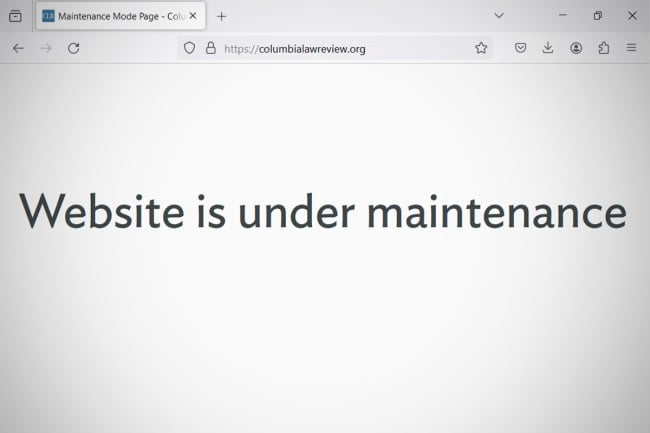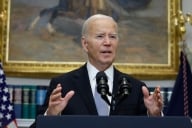You have /5 articles left.
Sign up for a free account or log in.

A screenshot of the Columbia Law Review’s website as of Wednesday evening.
Columbia Law Review
On Monday morning, the student-edited Columbia Law Review published its latest issue online. Hours later, the website became a blank white space with a one-line note saying, “Website is under maintenance.”
The issue had contained an article by Rabea Eghbariah, the same Palestinian Harvard University law degree candidate who had a different piece rejected by the Harvard Law Review in November after an unusual editorial intervention.
Eghbariah’s 105-page article argues that the Nakba—Arabic for “catastrophe”—has evolved from referring to Israel’s historical displacement of Palestinians “into a brutally sophisticated structure of oppression.” Eghbariah argues that the Nakba should be considered an “independent legal concept encapsulating a distinctive category of violence committed against a group.” He writes that “this ongoing Nakba includes episodes of genocide and variants of apartheid,” but proposed distinguishing “apartheid, genocide and Nakba as different, yet overlapping, modalities of crimes against humanity.”
Unlike what happened at Harvard, Eghbariah received the Columbia Law Review’s imprimatur for this new article and saw it published. But not for long.
On Monday morning—seven hours after the article was published, according to one outgoing student editor, Erika Lopez—the Review’s Board of Directors, which includes the law school’s dean and other faculty members and alumni, took down the Review’s entire website due to Eghbariah's article. It remained down as of Wednesday evening. The status of the upcoming print version of the issue is unclear.
In a letter to the publication’s student editors, the board wrote that it “traditionally is not involved in selecting or determining the content of the Law Review—that is the student editors’ job.” But in this case, it said there were “serious lapses in good governance that we are attempting now to redress.”
The board emphasized that many of the Review’s student editors were unaware that Eghbariah's article existed until shortly before publication. “The secrecy that surrounded this article’s editing and substantiation review is unacceptable,” the board wrote. “It is also unprecedented, in that every piece is either worked on by, or available on request to, all student editors during the editing process.”
But some student editors are contesting the board’s criticisms. Lopez, who spoke to Inside Higher Ed, says it’s the board that has done something “unprecedented.” She described the editing process and events leading up to the website takedown—the latest conflagration over pro-Palestinian speech and academic freedom at Columbia, which has been a locus of such controversies since the war began in the fall.
A ‘Rigorous’ Edit
Lopez, who graduated last month from Columbia Law, said she made the initial suggestion that the journal publish a piece on Palestine. “I had the idea to use the Columbia Law Review as a platform to discuss the ongoing violence in Palestine,” said Lopez, an editor who’s also the diversity, equity and inclusion chair on the publication’s student administrative board.
Shortly before the administrative board voted to solicit a piece on the issue, Lopez said, “The Harvard Law Review debacle occurred” involving Eghbariah. The 23 student members of the board in attendance for the vote then unanimously decided to commission the piece, Lopez said.
Editors reached out to Eghbariah while also considering other authors’ articles on Palestine, she said, but they ended up offering Eghbariah a contract in December. The student editors got to work on his submission, and it went through the normal six rounds of editing—“a very rigorous level of editorial process,” Lopez said.
Being "very aware" of what she called a "repressive climate” for pro-Palestinian speech at Columbia, Lopez said, “we made the decision to limit the pool of editors who could have access” to the drafts. This was done, she said, "in consultation with" the entire administrative board. The purpose, she said, was to “prevent the release of early drafts that had not undergone full editing.”
The drafts weren’t published to the normal Dropbox where all student editors, around 100 people, could read them, but instead to a separate Google Drive, Lopez said. Still, she said 30 student editors worked on the article in all—about the usual number for any article. It was set to publish at midnight Monday, she said.
But on Saturday, according to an email Lopez provided, editor-in-chief Alexandria Iraheta Sousa emailed the wider body of student editors to give them a “heads up” about the coming article. Sousa emailed them the article abstract, which included the statements quoted above comparing Israel’s treatment of Palestinians to genocide and apartheid.
“The Review publishes pieces on a wide range of topics, many of which touch on sensitive issues that affect real people’s lives,” Sousa wrote. “We realize, however, that the subject matter of this article has a particularly strong salience right now, so we wanted to notify you before it was published. I also wanted to remind you that, whether they pertain to this article or to anything else related to the Review, any media inquiries asking anyone to speak on behalf of the Review should be forwarded to me.”
That is when, according to Lopez, one of the student editors who didn’t edit the article emailed the Board of Directors of the Columbia Law Review Association Inc., notifying the board of the article. Lopez said she doesn’t know why the student leaked it, and didn’t want to provide details on the leaker to prevent harassment and reprisals.
The Board Intervenes
Once they’d been notified, Lopez said, some board members made the “request/demand that the entire finalized, ready-to-go version gets sent to the entire staff” and to board members as well. She said that’s never happened with any article, to her knowledge—once the executive managing editor and editor-in-chief make final edits, the full Review staff typically only sees the final product upon publication.
Lopez said the most substantial requests for the Review to change course were coming from board members Gillian Metzger, Columbia’s Harlan Fiske Stone Professor of Constitutional Law, and Ginger Anders, whom The Intercept has reported is an alumna and a former assistant to the U.S. solicitor general. (Neither responded to Inside Higher Ed’s requests for interviews Wednesday. Sousa, the student editor-in-chief, also didn’t respond to a request for an interview.)
Despite it not being normal practice, Sousa sent the entire final version of the article out to all student editors on Sunday at 9:10 p.m., Lopez said. That email, which Lopez provided, said that the imminent publication had been delayed.
“In light of the topic, several of you have asked to be shared on the final version,” Sousa wrote in the email. The new plan was to publish on Friday. But Lopez said fears of the article being leaked ahead of publication set in.
Sousa got an email from a former board member, asking to remove his name from the masthead, Lopez said. “We’re wondering how does this person know what’s going on right now, he’s not even a board member, how did he receive the piece?” She said editors were also “starting to hear whispers” that some student editors were talking to professors and mentors, worried about losing summer and future jobs, clerkships and other opportunities because of their affiliation with the Review and this article.
So, Sousa, in consultation with the smaller group of 11 editors shepherding the article, decided to go ahead and publish Monday, Lopez said. But, later that morning, the board took the website down. “You can’t even see the masthead, you can’t even see the ‘About’ page—it’s gone,” Lopez said.
Negotiating a Truce?
The Board of Directors, faced with national media attention and public criticism from student editors, has provided some explanation of its actions. While the board members that Inside Higher Ed contacted didn’t respond to requests for comment, a Columbia University spokesperson shared unsigned statements from the board.
In a Monday statement, the board said it had only learned the previous afternoon about the article, and it mentioned some student editors’ concerns that they hadn’t had much more forewarning the article was coming. The board said it had requested the student leadership of the Review to “delay publication for a few days so that, at a minimum, the manuscript could be shared with all student editors, to provide them with a chance to read it and respond.” After the Review published anyway Monday, the board said it “temporarily suspended its website,” to “provide time for The Law Review to determine how to proceed.”
On Tuesday, the board wrote to student editors that ”whatever the intent,” the lack of earlier, broader sharing of the article represented “a profound deviation from the norms of respect, trust and collegiality on which the Review depends. It also inevitably raises questions about the adequacy of the editing and substantiation processes to which the piece was subjected.”
The board said that student editors were right to be worried about their association with the essay. It “will clearly be controversial and potentially have an impact on all associated with the Review,” the board said. It said the decision to take down the website does “not reflect a view on the content of the piece or a decision on publication.”
But the board now seems to be in negotiating mode. Saying that “the piece is already circulating publicly, which we think as a practical matter means it is published”—and that it wants to get the website back up—it asked for a disclaimer note to be added to the article. That disclaimer would say, among other things, that it “was solicited outside of the usual articles selection process and edited and substantiated by a limited number of student editors. Contrary to ordinary practice, it was not made available for all student editors to read.”
Lopez opposes adding a disclaimer. “I think that a lot of this is a distraction from the more substantive concerns that the Board of Directors may have with the content of the piece,” she said. She said board members “took unprecedented steps themselves and yet they’re arguing that we are the ones doing something unusual.”
In Lopez’s view, the disclaimer “would single out this piece for the rest of time” as being somehow “less than.” And national media have already reported about this publication controversy, she noted.
“Already history will reveal what happened with this piece anyway,” Lopez said. “What other disclaimer do you need?”








